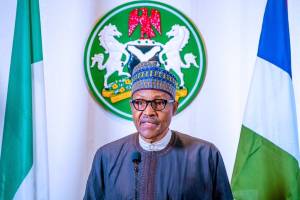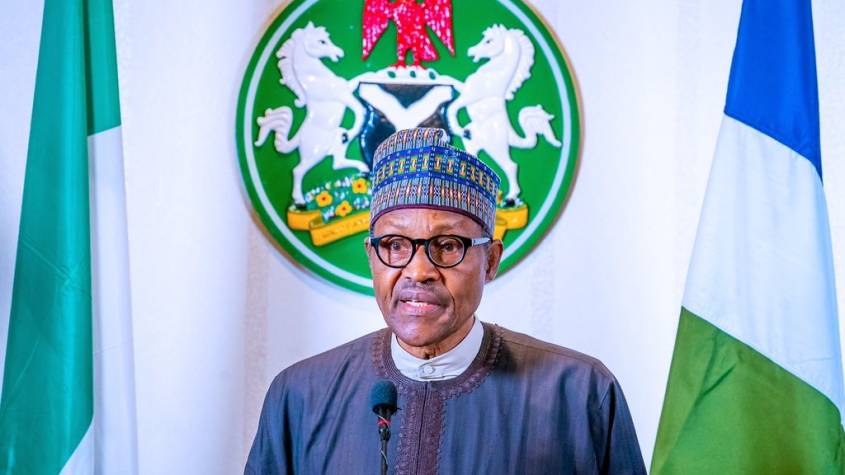ANALYSIS | Nigeria’s anti-graft crusade: A case of patriotism or vendetta?
“If we don’t kill corruption, corruption will kill Nigeria” – President Muhammadu Buhari (2015)

By Adam Alqali
Not even the euphoria that greeted Nigeria’s 1999 return to democracy equated that of the reemergence of Muhammadu Buhari as the country’s leader in 2015. His past stewardship of Nigeria (1984-85) had earned the lanky, gap-toothed ex-army general the image of an austere, taciturn and no-nonsense man whose uprightness and incorruptibility had become legendary.
Before becoming military head of state, Buhari had served as a state governor and oil minister; his enduring spartan lifestyle and sheer abhorrence for ostentatious living stood him out among his peers, superiors and subordinates alike.
Prior to 2015, the self-confessed dictator turned democrat had abortively aspired to rule Africa’s most populous nation cum biggest economy as a civilian president for three consecutive times. In a country where politicians switch political parties with the ease they change their flowing robes, he cut the image of a consistent and disciplined politician whose honesty was attested to even by his arch political enemies.
In many ways, the build-up to the 2015 Nigerian elections was perfectly all right for a second Buhari presidency: Nigeria had suffered 16 years of misgovernance by the Peoples Democratic Party (PDP), whose mandate of the sleeping Giant of Africa had been characterised by sleaze in mindboggling proportions and insecurity occasioned by the Boko Haram insurrection.
Fortunately for then opposition All Progressives Congress (APC), PDP’s prime flaws were Buhari’s apparent vital strengths. Against this backdrop, even his erstwhile sworn enemies concurred he was the best man for the job – and a second Buhari presidency became inevitable! Now, more than six years into his ‘second coming’ all pundits are asking is: Has the Buhari anticorruption crusade failed?
Corruption as PDP’s albatross
Endemic corruption has been described as the major straw that broke PDP’s 16-year grip on Nigeria. [i] Buhari’s APC adeptly capitalized on PDP’s encumbrance, taunting and denouncing the then ruling party for superintending the greatest embezzlement of Nigeria’s oil wealth. While selling its own candidate as the only captain capable of steering away the Nigerian ship from going adrift.
Like Buhari, upon his election as civilian president at the onset of Nigeria’s Fourth Republic in 1999, PDP’s President Olusegun Obasanjo had initiated what was until then Nigeria’s most systematic effort to combat corruption.[ii] Certainly not with the same fervor and vigour as the Buhari administration, whose major policy thrust had been the fight against sleaze.
Thus, various laws, policies and instruments wholly dedicated to fighting graft were enacted followed by institutions, panels and commissions of inquiry to bring them to life. Among those anti-graft institutions was the Economic and Financial Crimes Commission (EFCC) set up as the country’s top anti-corruption watchdog.
Despite being instrumental in prosecuting high-level politicians and businessmen as well as recovering and repatriating substantial stolen funds for Nigeria, EFCC’s effectiveness was greatly inhibited by political interference.[iii] For its lack of independence, the anti-graft agency became a willing tool in the hands of the power elite, with which they hound and torment their opponents.
APC’s anti-corruption crusade
Thus, the election of President Buhari in March 2015 appeared to have heralded a new era for a country that had survived decades of military misrule and years of PDP’s gross financial mismanagement. The exhilaration that hailed his election was like no other; Nigerians, at home and in diaspora, were mostly unanimous in the prevailing belief that their country had finally got it right.
For the poor denied basic needs despite their country’s vast wealth, the atmosphere was that of unfettered hope: the saviour of the masses and long-awaited messiah – whom they believed the Nigerian power elite had for years, connived and contrived to deprive a second shot at the country’s top job – had finally mounted the saddle. Contrastingly, the mood was one of trepidation for the notoriously corrupt political elites whose unduly acquired privileged life was threatened by the arrival of the new sheriff in town.
So real was the belief that Africa’s slumbering giant had finally awaken from her deep slumber that things began to take shape on their own in Nigeria’s deeply inefficient public sector – thanks to the new sheriff’s ‘body language.’ No other elected president in Nigeria’s chequered history had come into office with such a combination of unquantifiable amount of goodwill and unalloyed sense of trust from the citizens as Buhari in his comeback. The general belief was that the Nigerian ship had finally acquired its most deserved captain.
In his second spell, Buhari did successfully implemented far-reaching anti-graft reforms, notably the Treasury Single Account (TSA), Biometric Verification Number (BVN), an Asset Recovery Strategy, a Whistleblowing Policy as well as the Presidential Initiative on Continuous Audit.[iv] These key initiatives have collectively fetched the country billions of dollars in the last five years. The implementation of the TSA alone saves the Nigerian government the equivalent of over USD100 million, every month. [v]
From inception, the APC administration has entered into several bilateral agreements with countries such as US, UK, and UAE to seize and repatriate illicit assets of Nigerian officials. This has fostered closer collaborations between the EFCC and its counterparts across the globe. Subsequently, the agency had launched series of investigations on former high-ranking public officials from previous administrations, including cabinet ministers, state governors and senior civil servants. [vi]
Has APC’s anti-graft crusade failed?
Despite its many verifiable successes, the APC government’s anti-graft war has also been plagued by political interference, selectiveness, and vendetta against opposition politicians and those not in the good books of the ruling elites. This has led many analysts to conclude that the crusade, despite its best intentions, is either faltering or had already failed. The futility of Nigeria’s anticorruption campaigns is attributed to successive governments’ aversion to institutional autonomy for anti-graft institutions.[vii]
A notable pointer to the lack of progress in Nigeria’s fight against graft is its ranking in the Corruption Perceptions Index (CPI). In 2020, among 180 countries, the country had moved from its 146th position in 2019 to 149th [viii] – its worst record since 2015. Nigeria scored a mere 25 out of 100 points. [ix] Although the Buhari administration dismissed the CPI ranking, data from Nigeria’s National Bureau of Statistics (NBS) confirms that corruption remains an intractable problem in the country.[x]
While President Buhari has thus far personally escape accusations of corruption, his enduring ascetic reputation is significantly tainted by his seeming failure to tackle grave corruption allegations against his aides and cabinet ministers.[xi] A notable case was that of erstwhile secretary of the federation Babachir Lawal indicted for allegedly diverting funds meant for persons displaced by the Boko Haram conflict. [xii] Yet, the president only begrudgingly sacked him after persistent pressure from the press.
For the war against corruption to succeed in Nigeria, the EFCC and allied agencies must evolve into strong autonomous institutions that are free from undue executive interference. That is the only assurance they will be able to fight corruption without fear or favour.
Buhari came to power vowing to stamp out graft, fight insecurity and revive the Nigerian economy. More than by anything else, the Buhari legacy would be shaped by his ability or inability to fight graft to a standstill!
[i] https://www.theafricareport.com/70730/nigeria-the-buhari-administrations-failed-anti-corruption-crusade/
[ii] file:///C:/Users/Adam%20Alqali/Downloads/A_Review_of_Anti-Corruption_Wars_in_Nigeria.pdf
[iii] https://ace.soas.ac.uk/nigerias-efcc/
[iv] https://www.theafricareport.com/70730/nigeria-the-buhari-administrations-failed-anti-corruption-crusade/
[v] https://www.vanguardngr.com/2020/11/fg-saves-n45-billion-from-tsa-monthly-finance-minister/
[vi] https://www.controlrisks.com/our-thinking/insights/buharis-fight-against-corruption
[vii] https://www.theafricareport.com/70730/nigeria-the-buhari-administrations-failed-anti-corruption-crusade/
[viii] https://www.transparency.org/en/cpi/2020/index/nga
[ix] https://www.google.com/amp/s/www.bbc.com/pidgin/media-55831528.amp
[x] https://businessday.ng/editorial/article/buhari-6yrs-on-corruption-still-an-intractable-economic-problem/
[xi] https://www.theguardian.com/world/2019/feb/11/nigeria-election-mr-honesty-muhammadu-buhari-tainted-by-failure-to-tackle-corruption
[xii] https://www.premiumtimesng.com/news/headlines/308926-efcc-files-corruption-charges-against-babachir-lawal-ayo-oke.html
















